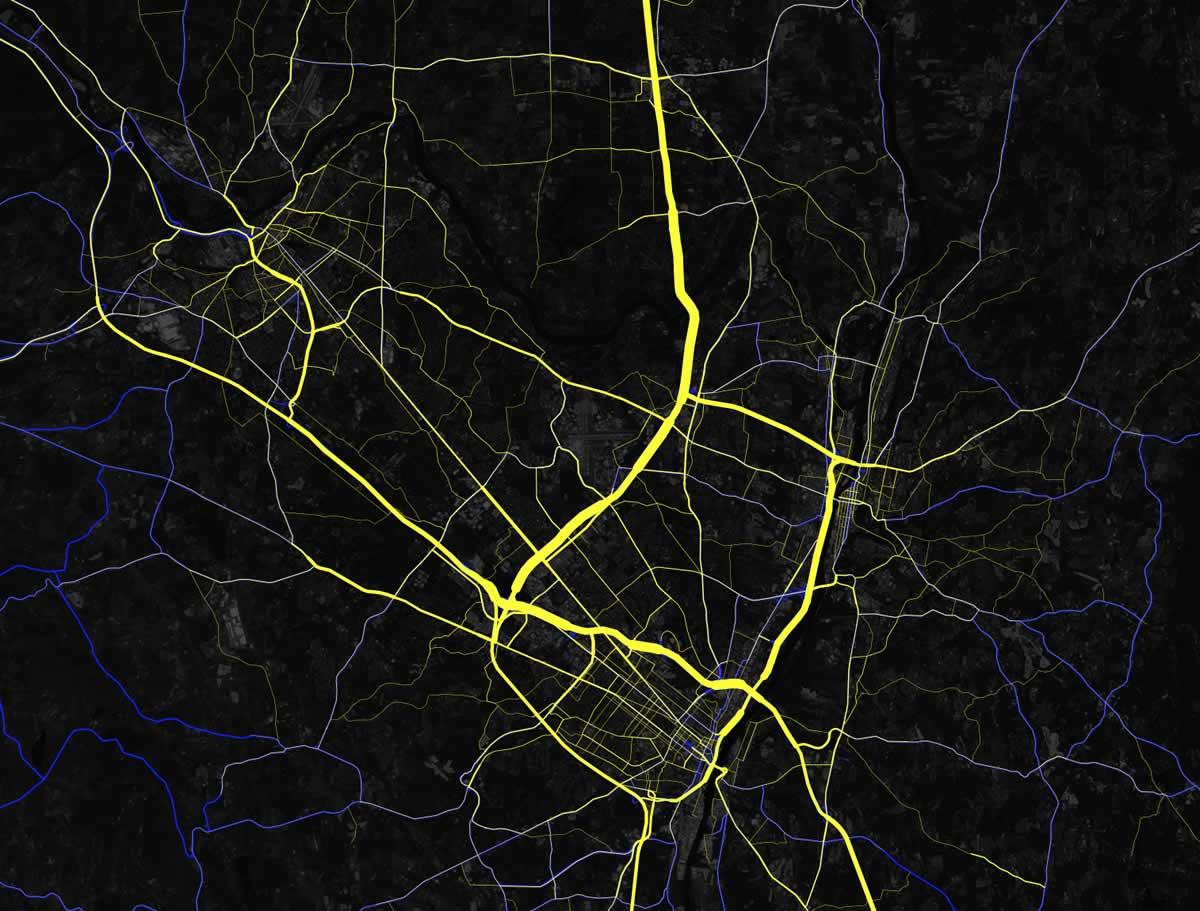Traffic problems, relatively speaking

The Capital Region's traffic arteries, a clip from a national map created by Mapbox using data from the federal Highway Performance Monitoring System and OpenStreetMap.
Sometimes it's good to get a wider perspective on the sorts of things we all complain about.
Like traffic. From a national perspective, the Albany area doesn't really have traffic.
Albany ranked #118th in the United States for traffic congestion last year, according to the new global traffic scorecard from the transportation data consultancy INRIX (more about the report). Drivers in this area were estimated to spend just 4 percent of their driving time in congestion, 14 hours across the whole year.
In Los Angeles -- which topped the ranking for US cities and the world -- the total was 102 hours spent in congestion. And in New York City, ranked #2 in the US, the total was 91 hours.
Here are a few more things about that.
This doesn't mean there aren't problem spots
Even if traffic congestion isn't a relatively big deal here in the overall picture, there are certainly specific spots where people experience chronic frustration. There are good reasons to pay attention to those snags for all sorts of reasons, ranging from safety to the environment.
Some of these hot spots won't have easy solutions. For example, the New Scotland Ave corridor in Albany moves a bunch of people in and out of job sites such as Albany Med and St. Peter's every day through residential neighborhoods. But that's even more reason to work the problems there.
This isn't a reason to be complacent
Commuting times for the Albany metro are been slowly ticking up over the last decade, according to Census Bureau estimates. The average commute is now 23 minutes long, which is up about a minute during that time.
Like anything worthwhile, the area's transportation network needs ongoing attention and investment. CDTA is already good -- but there are ways it could do better, among them expanding the bus rapid transit system to serve more people faster.
Also: It's worth putting effort into planning and development to head off potential problems in the future, whether it's denser residential and employment centers near transit nodes or curbing sprawl or working to help shift attitudes.
This isn't just an issue for place like Albany and its huge daily commuting tide. A place such as Colonie, with its ongoing growth and resulting congestion, would benefit, too.
Congestion isn't always bad
Many of the US cities atop the traffic ranking are also among the most economically successful. The Capital Region couldn't probably stand a little more congestion if it meant more people and jobs.
Say Something!
We'd really like you to take part in the conversation here at All Over Albany. But we do have a few rules here. Don't worry, they're easy. The first: be kind. The second: treat everyone else with the same respect you'd like to see in return. Cool? Great, post away. Comments are moderated so it might take a little while for your comment to show up. Thanks for being patient.
Comments
Increasing commute times could mean people moving further away from work because commuting is relatively easy and congestion free.
... said AlbanyJen on Feb 6, 2018 at 1:52 PM | link
My commute (direct) has more than doubled, but I’ve also moved from Albany to the woods, and work in Troy... though I am deeply amused that I cross the river twice to go to work...????????
... said Andy K on Feb 6, 2018 at 6:31 PM | link
Give it a few years.
Self-driving cars and buses will make most of this problem go away. They'll be faster and safer. Not tomorrow or next week, but a decade from now, possibly. Any possible infrastructure investment would be planned on a longer horizon that that so.....
... said stan on Feb 7, 2018 at 9:17 AM | link
Nobody went there yet, but I will: Gondolas!
... said Andrew Gregory on Feb 7, 2018 at 12:29 PM | link